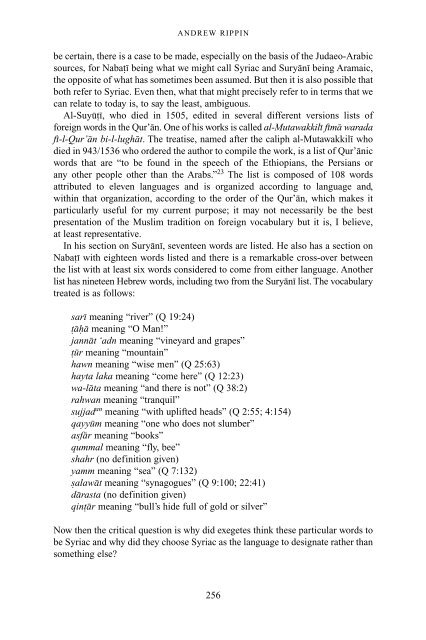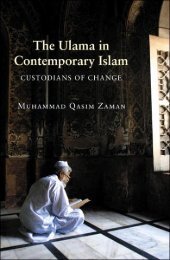The Qur'an in its historical context (pdf - Islam and Christian-Muslim ...
The Qur'an in its historical context (pdf - Islam and Christian-Muslim ...
The Qur'an in its historical context (pdf - Islam and Christian-Muslim ...
You also want an ePaper? Increase the reach of your titles
YUMPU automatically turns print PDFs into web optimized ePapers that Google loves.
ANDREW RIPPIN<br />
be certa<strong>in</strong>, there is a case to be made, especially on the basis of the Judaeo-Arabic<br />
sources, for Nabati be<strong>in</strong>g what we might call Syriac <strong>and</strong> Suryani be<strong>in</strong>g Aramaic,<br />
the opposite of what has sometimes been assumed. But then it is also possible that<br />
both refer to Syriac. Even then, what that might precisely refer to <strong>in</strong> terms that we<br />
can relate to today is, to say the least, ambiguous.<br />
Al-Suyuti, who died <strong>in</strong> 1505, edited <strong>in</strong> several different versions lists of<br />
foreign words <strong>in</strong> the Qur’an. One of his works is called al-Mutawakkili fima warada<br />
fi-l-Qur’an bi-l-lughat. <strong>The</strong> treatise, named after the caliph al-Mutawakkili who<br />
died <strong>in</strong> 943/1536 who ordered the author to compile the work, is a list of Qur’anic<br />
words that are “to be found <strong>in</strong> the speech of the Ethiopians, the Persians or<br />
any other people other than the Arabs.” 23 <strong>The</strong> list is composed of 108 words<br />
attributed to eleven languages <strong>and</strong> is organized accord<strong>in</strong>g to language <strong>and</strong>,<br />
with<strong>in</strong> that organization, accord<strong>in</strong>g to the order of the Qur’an, which makes it<br />
particularly useful for my current purpose; it may not necessarily be the best<br />
presentation of the <strong>Muslim</strong> tradition on foreign vocabulary but it is, I believe,<br />
at least representative.<br />
In his section on Suryani, seventeen words are listed. He also has a section on<br />
Nabati with eighteen words listed <strong>and</strong> there is a remarkable cross-over between<br />
the list with at least six words considered to come from either language. Another<br />
list has n<strong>in</strong>eteen Hebrew words, <strong>in</strong>clud<strong>in</strong>g two from the Suryani list. <strong>The</strong> vocabulary<br />
treated is as follows:<br />
sari mean<strong>in</strong>g “river” (Q 19:24)<br />
taha mean<strong>in</strong>g “O Man!”<br />
jannat ‘adn mean<strong>in</strong>g “v<strong>in</strong>eyard <strong>and</strong> grapes”<br />
tur mean<strong>in</strong>g “mounta<strong>in</strong>”<br />
hawn mean<strong>in</strong>g “wise men” (Q 25:63)<br />
hayta laka mean<strong>in</strong>g “come here” (Q 12:23)<br />
wa-lata mean<strong>in</strong>g “<strong>and</strong> there is not” (Q 38:2)<br />
rahwan mean<strong>in</strong>g “tranquil”<br />
sujjad an mean<strong>in</strong>g “with uplifted heads” (Q 2:55; 4:154)<br />
qayyum mean<strong>in</strong>g “one who does not slumber”<br />
asfar mean<strong>in</strong>g “books”<br />
qummal mean<strong>in</strong>g “fly, bee”<br />
shahr (no def<strong>in</strong>ition given)<br />
yamm mean<strong>in</strong>g “sea” (Q 7:132)<br />
salawat mean<strong>in</strong>g “synagogues” (Q 9:100; 22:41)<br />
darasta (no def<strong>in</strong>ition given)<br />
q<strong>in</strong>tar mean<strong>in</strong>g “bull’s hide full of gold or silver”<br />
Now then the critical question is why did exegetes th<strong>in</strong>k these particular words to<br />
be Syriac <strong>and</strong> why did they choose Syriac as the language to designate rather than<br />
someth<strong>in</strong>g else?<br />
256



